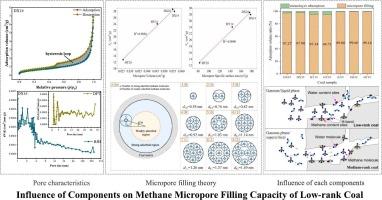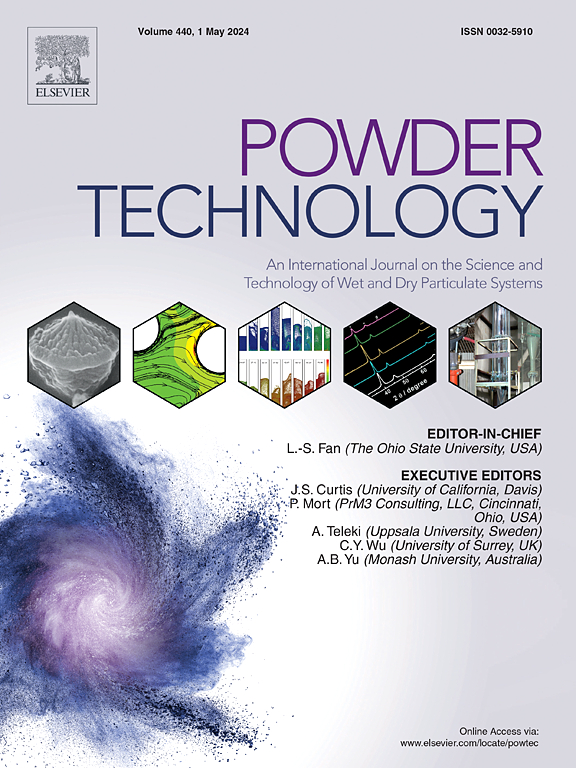成分对低阶煤甲烷微孔填充能力的影响
IF 4.5
2区 工程技术
Q2 ENGINEERING, CHEMICAL
引用次数: 0
摘要
采用 N2/CO2 吸附方法测量了低阶煤的孔隙特征,并进行了甲烷等温吸附实验以进一步评估。N2 吸附实验结果表明,孔径范围为 1.03 至 3.26 nm,孔体积(PV)为 0.006-0.013 cm3/g CO2 吸附实验结果表明,微孔尺寸分布为 0.479-0.548 nm,孔体积(PV)为 0.026-0.056 cm3/g。甲烷等温吸附实验表明,最大吸附体积为 12.82-28.68 cm3/g。为中高阶煤开发的微孔填充理论表明,超过 94.71% 的甲烷储存在微孔中,验证了该理论对低阶煤的适用性。通过理论分析和计算,得出了低阶煤中甲烷的微孔充填能力与其各种成分含量之间关系的无量纲表达式。这项研究为低阶煤开采区的瓦斯防突工作提供了理论依据。本文章由计算机程序翻译,如有差异,请以英文原文为准。

Influence of components on methane micropore filling capacity of low-rank coal
N2/CO2 adsorption methods were used to measure pore characteristics of low-rank coal, and methane isothermal adsorption experiments were conducted for further evaluation. Results from N2 adsorption experiments reveal that the pore size ranges from 1.03 to 3.26 nm, with pore volumes (PVs) of 0.006–0.013 cm3/g The CO2 adsorption experiments reveal that the micropore size distribution is 0.479–0.548 nm, with PVs of 0.026–0.056 cm3/g. The methane isothermal adsorption experiments shows that the maximum adsorption volume is 12.82–28.68 cm3/g. The micropore filling theory developed for medium to high-rank coals shows that over 94.71 % of methane is stored in micropores, validating its applicability to low-rank coal. Through theoretical analysis and calculations, a dimensionless expression has been derived for the relationship between the micropore filling capacity of methane in low-rank coal and the content of its various components. This study offers a theoretical foundation for outburst prevention of gas in low-rank coal mining regions.
求助全文
通过发布文献求助,成功后即可免费获取论文全文。
去求助
来源期刊

Powder Technology
工程技术-工程:化工
CiteScore
9.90
自引率
15.40%
发文量
1047
审稿时长
46 days
期刊介绍:
Powder Technology is an International Journal on the Science and Technology of Wet and Dry Particulate Systems. Powder Technology publishes papers on all aspects of the formation of particles and their characterisation and on the study of systems containing particulate solids. No limitation is imposed on the size of the particles, which may range from nanometre scale, as in pigments or aerosols, to that of mined or quarried materials. The following list of topics is not intended to be comprehensive, but rather to indicate typical subjects which fall within the scope of the journal's interests:
Formation and synthesis of particles by precipitation and other methods.
Modification of particles by agglomeration, coating, comminution and attrition.
Characterisation of the size, shape, surface area, pore structure and strength of particles and agglomerates (including the origins and effects of inter particle forces).
Packing, failure, flow and permeability of assemblies of particles.
Particle-particle interactions and suspension rheology.
Handling and processing operations such as slurry flow, fluidization, pneumatic conveying.
Interactions between particles and their environment, including delivery of particulate products to the body.
Applications of particle technology in production of pharmaceuticals, chemicals, foods, pigments, structural, and functional materials and in environmental and energy related matters.
For materials-oriented contributions we are looking for articles revealing the effect of particle/powder characteristics (size, morphology and composition, in that order) on material performance or functionality and, ideally, comparison to any industrial standard.
 求助内容:
求助内容: 应助结果提醒方式:
应助结果提醒方式:


